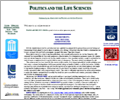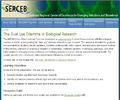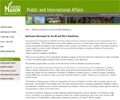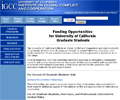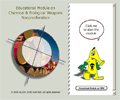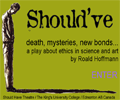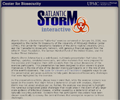Federation of American Scientists
This set of educational modules is intended to raise awareness about agricultural biosecurity issues in the United States and is targeted towards the educated public. We focus on agriculture, defined as the domestication of crops and animals, since it yields a variety of products essential to our daily lives, including food grains, vegetables, meat, milk, eggs, cotton, and wool. These modules address two different aspects of agricultural biosecurity, the nexus of agricultural production and international security. They include interviews with experts, historical perspectives on agro-terrorism, and regulations.
Federation of American Scientists
Illustrate the implications of "dual-use" biology research through case studies of different researchers who have done dual-use research and provides a historical background on bioterrorism, bioweapons and the current laws, regulations and treaties that apply to biodefense research. They include interviews with researchers as well as the primary scientific research papers and discussion questions meant to raise awareness about the importance of responsible biological research.
Bradford Disarmament Research Centre
The Bradford Disarmament Research Centre along with the National Defence Medical College in Japan and the Landau Network Centro Volta in Italy have developed an Educational Module Resources (EMR) designed to support life scientists and educators in learning about biosecurity and dual use issues but also in building educational material for teaching of students. The EMR consists of 21 lectures, accompanying notes for the lecturer and direct links to the references and videos; it is intended to be a resource that can be used by a lecturer in order to develop one or more lectures, seminars, role-plays or other teaching aids suitable for the course he or she is presenting.
Center for Arms Control and Non-Proliferation
Online educational materials have been created for life scientists by life scientists. The materials are designed primarily for use by students embarking upon their careers - advanced undergraduates and first-year graduate biology and medical students – and for their teachers. Any not-for-profit use is encouraged, including instructional use in colleges, universities, and other institutions. Currently the project is hosted by Politics and the Life Sciences
Duke University - Southeast Regional Center of Excellence for Emerging Infections and Biodefence
The SERCEB Policy, Ethics and Law Core has developed an online module to assist those involved with the biological sciences in better understanding the “dual-use” dilemma inherent in such research. This module is intended for graduate and post-doctoral students, faculty members, and laboratory technicians involved in biological research in microbiology, molecular genetics, immunology, pathology, and other fields related to emerging infectious disease and biological threats to human, animal, and environmental health. The module consists of a ~20 minute online presentation followed by a brief assessment.
George Mason University
The biodefense Graduate Program in the Department of Public and International Affairs at George Mason University offers MS and PhD degrees in Biodefense. The goal of the program is to provide students with the knowledge and skills to assess the risks posed by natural and man-made biological threats, develop strategies for reducing these risks to national and international security, and bridge the gap between scientists and policy-makers. Given the breadth of the program, applicants with backgrounds in both the natural sciences and social sciences are welcome.
Institute on Global Conflict and Cooperation
The multidisciplinary Public Policy and Biological Threats training program fosters a dynamic, collaborative, multidisciplinary learning environment for junior faculty, Ph.D. and professional-school students in the University of California system, and private industry professionals to analyze policy responses to the threat of bioterrorism. The biological threats training program includes an annual two-week “biological threats boot camp.”
MIT Security Studies Program
The Combating Bioterrorism / Pandemics: Implementing Policies for Biosecurity course is a 3 day summer professional course offered by the Security Studies Program at MIT. The threats of bioterrorism and global pandemics pose new challenges for public health, law enforcement and national security agencies. All these agencies face new biosecurity priorities, including learning to collaborate with each other. Yet agencies have deeply embedded professional norms and organizational cultures, which resist change. MIT experts and affiliates explore the obstacles to implementation and strategies to overcome them.
NIH Office of Biotechnology Activities
The Dual Use Research Program is a focal point for the development of policies addressing life sciences research that yield information or technologies with the potential to be misused to threaten public health or other aspects of national security.
NOVA
The NOVA Online: Bioterror website is a companion to the November 2001 NOVA program "Bioterror" which follows three New York Times reporters seeking information on biological weapons and the threat they pose. The site provides information on the history of biological warfare, biodefense, and the biological weapons programs of 20 countries. Also included are interviews with three individuals involved in the former biological weapons programs of the US and Soviet Union. A teacher's guide provides activities for teaching the information to students in grades 5-8 and grades 9-12. The NOVA website is produced for PBS Online by WGBH out of Boston, MA.
Nuclear Threat Initiative
Biological Warfare (BW) Terrorism Tutorial addresses several aspects of BW terrorism, including the biological agents of concern, the characteristics and motivation of terrorists, approaches to prevention, and the available policy responses
Stockholm International Peace Research Institute
This education module, created jointly by SIPRI, the Free University Brussels, and the International Relations and Security Network, provides knowledge and understanding of chemical and biological weapons proliferation at basic, intermediate, or advanced levels.
The King's Center for Visualization in Science - Ethics in Science Project
“Scientists are not born with ethics, nor is science ethically neutral,” says Roald Hoffmann, Nobel Laureate in Chemistry. At The King's Centre for Visualization in Science, we help students, teachers, and the public see and understand ethical dimensions to scientific work. Current projects provide web materials for an IUPAC project that raises awareness of the multiple ways humans use chemicals and for Roald Hoffmann’s play ‘Should’ve.’ The play tells the story of the aftermath of a prominent chemist's suicide and uses the interactions of three people close to him to examine dual-use research and the ethics of science and art.
University of Exeter - Biological Weapons & Codes of Conduct
This website includes a chronology of past discussions about codes for bioscientists, notice of relevant events, publications and references information, dual use education seminars and role-playing exercises, and links to key organizations.
University of Pittsburgh Medical Center Center for Biosecurity
Atlantic Storm, was a bioterrorism “table-top” exercise convened on January 14, 2005 and Atlantic Storm Interactive is a web-based, multimedia presentation that takes the briefings, updates, simulated newscasts, and other materials that were prepared for the exercise and integrates them with excerpts from the actual discussions of the exercise participants. This presentation has been designed to allow viewers to place themselves in the role of one of the decision-making participants or in the role of one of the event’s observers. The Guide for Viewers and Facilitators suggests ways to use this presentation and poses questions to help guide discussion of biosecurity challenges that were highlighted by the exercise..



